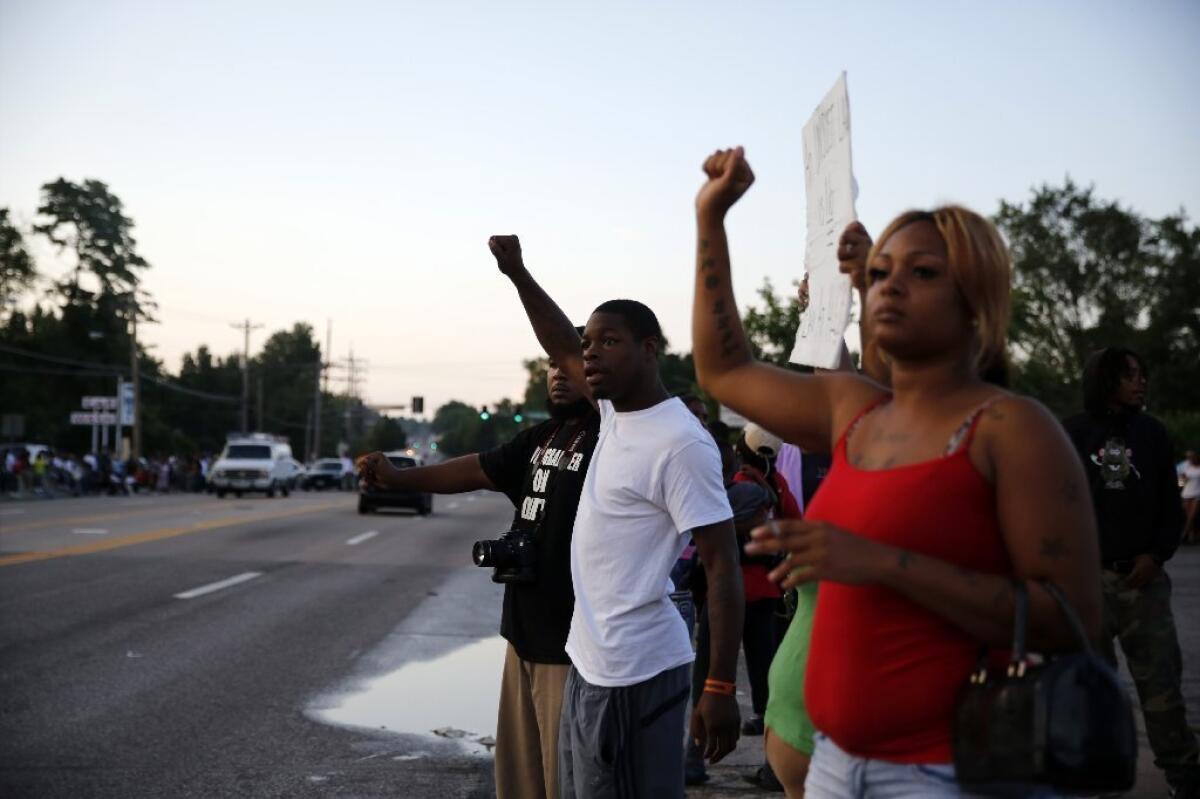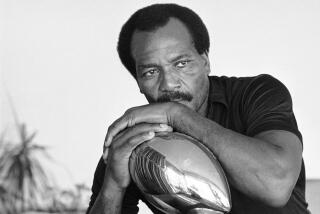Opinion: NYT regrets calling Michael Brown ‘no angel,’ but was the newspaper so wrong?

- Share via
The New York Times is expressing contrite second thoughts about a profile of Michael Brown, the 18-year-old who was shot to death by a police officer in Ferguson, Mo., that described Brown as “no angel.”
Here’s the paragraph in context:
“Michael Brown, 18, due to be buried on Monday, was no angel, with public records and interviews with friends and family revealing both problems and promise in his young life. Shortly before his encounter with Officer Wilson, the police say he was caught on a security camera stealing a box of cigars, pushing the clerk of a convenience store into a display case. He lived in a community that had rough patches, and he dabbled in drugs and alcohol. He had taken to rapping in recent months, producing lyrics that were by turns contemplative and vulgar. He got into at least one scuffle with a neighbor.”
Margaret Sullivan, the NYT’s public editor, called the “no angel” reference a “regrettable mistake,” agreeing with the “many” Times readers who were angry and disappointed. Even the reporter who wrote the piece, John Eligon, conceded on reflection that “I wish I would have changed that.”
I read the profile and didn’t find the “no angel” line objectionable. (Who among us is an angel?) Certainly in using it the writer wasn’t suggesting, as some obtuse readers complained, that “Mr. Brown deserved to die because he acted like many a normal teenager.”
Actually, far from besmirching Brown, the profile in its totality justified Eligon’s description of it as “a full, mostly positive picture.” After the paragraph quoted above, Eligon pivoted to this tribute worthy of a eulogy: “At the same time, he regularly flashed a broad smile that endeared those around him. He overcame early struggles in school to graduate on time. He was pointed toward a trade college and a career and, his parents hoped, toward a successful life.”
Also, as Eligon explained, the “no angel” reference was meant to be an echo of an anecdote at the beginning of the story: Brown telling his father about how, while looking at a cloud formation, he perceived “Satan chasing the angel and the angel running into the face of God.” This experience presaged Brown’s interest in the Bible and religion. “He was grappling with life’s mysteries,” Eligon wrote.
The Brown profile attracted so much attention because it was viewed through the prism of the ridiculous controversy over whether a young man has to be perfect (or a “gentle giant”) to expect fair treatment from the police. But the article also struck me as representative of a familiar journalistic genre: the hastily reported but lushly written feature story about a young person who dies.
The conventions for this sort of piece are the same whether the cause of death is a police officer’s bullet, a terminal disease or a freak accident on the football field. The story is laudatory — because who wants to disparage a dead kid? — and imbued with a suspicious certitude. Often a central motif is the dream that will now go unfulfilled. In Brown’s case, the dream was a modest one (college, a career, a successful life), but sometimes the aspirations are far loftier and usually utterly unrealistic.
Years ago, when I was working at another newspaper, fate conspired to take the lives of several young people in the community, resulting in several stories referring to inspiring dreams that died along with the dreamers. An exasperated editor let loose with the edict “No more dreams!” He wasn’t being hardhearted, just venting his frustration with a journalistic cliche.
I have a lot of sympathy for reporters who are pressed into service as instant biographers of people who aren’t around to tell their own stories and who are unlikely to be described by others with unsparing honesty.
The best of these writers are sometimes able, even on a tight deadline, to glean information about the deceased that justifies a conclusion that he or she was clearly headed for great things or had been grappling with life’s mysteries. But sometimes even the most observant reporter will be unable to draw any overarching conclusion about the character of someone who has died, young or old. In that case, it’s probably better to leave the eulogies to friends and family.
Follow Michael McGough on Twitter @MichaelMcGough3
More to Read
A cure for the common opinion
Get thought-provoking perspectives with our weekly newsletter.
You may occasionally receive promotional content from the Los Angeles Times.







